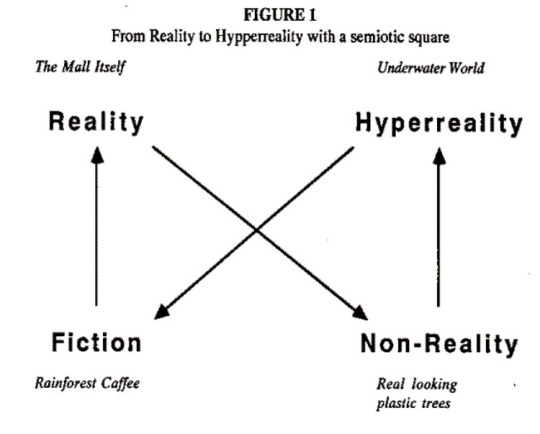#hyperreality
Text
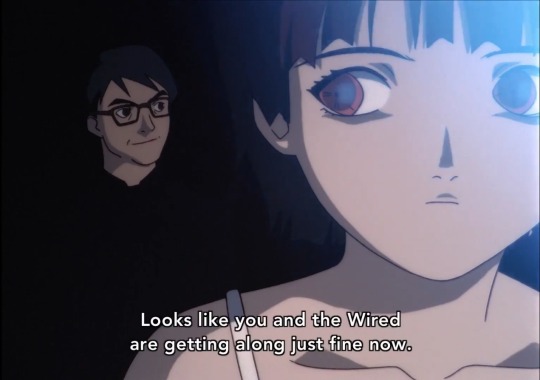


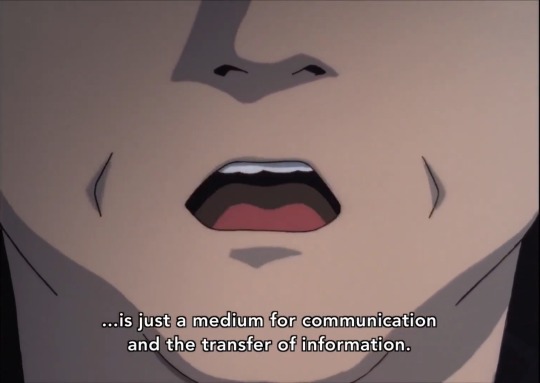
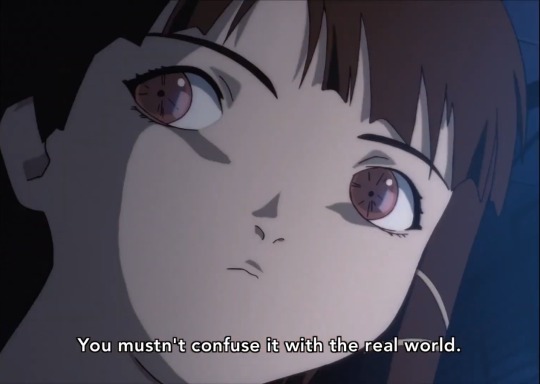

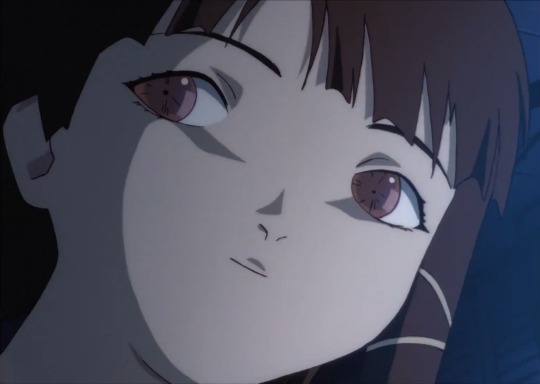

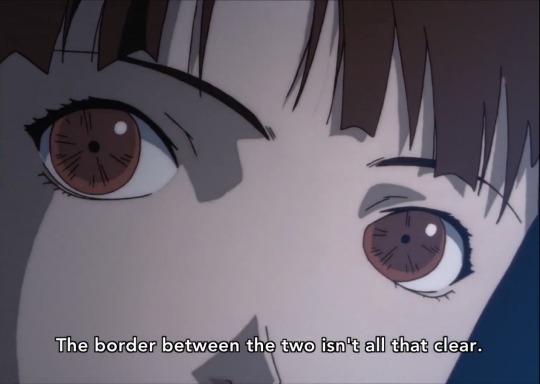
serial experiments lain (1998), dir. Ryūtarō Nakamura
1K notes
·
View notes
Text

263 notes
·
View notes
Quote
The very definition of the real becomes: that of which it is possible to give an equivalent reproduction.... At the limit of this process of reproductibility, the real is not only what can be reproduced, but that which is always already reproduced: the hyperreal.
Jean Baudrillard, Simulations
#reality#hyperreality#virtual#reproduction#repetition#quotes#Baudrillard#Jean Baudrillard#Simulations
30 notes
·
View notes
Text
Internet Ponder #1: Our Veiled Existence <3

Is it fair to compare our activity of being online with going to a costume party? U literally get to 'embody' a character. (image: atlasobscura on pinterest)
3 notes
·
View notes
Text
I think the fact that growing up I just assumed that people were telling me the truth that the pyramids in Giza are a real thing despite never seeing them myself, versus that now I’m kind of suspicious that the Las Vegas orb might be bullshit but have decided it doesn’t have enough bearing on my life to warrant actually looking into it maybe says something about hyperreality and modern culture and trained apathy and all that
4 notes
·
View notes
Text
Veronica Hollinger: Do you want to say anything about Jean Baudrillard?
Bruce Sterling: I think he's a great science-fiction writer.
William Gibson: Yeah, he's a cool science-fiction writer.
link
4 notes
·
View notes
Text

hyperfactory 🔸
14 notes
·
View notes
Text
Why you (might) like Baudrillard (ft. GRÆYS)

Almost everything that follows is just a reduced and free interpretation of what Adam said in one of his podcasts on the topic of Core Theory.
GRÆYS mentions that nature constantly challenges us and if we are unable to respond to this challenge we resort to extermination of nature. Lack of knowledge and inability to respond adequately forces us to set ourselves up for extermination, for eradication, for substitution of the natural. And this extrapolates to all scales, not only of the biosphere itself, but also in the perspective of the social. And initially the mass of the social does not know, does not understand the natural, because there is nothing to base it on. All terms, concepts, knowledge, all this must be constantly extracted from discourse. This can be extracted for example from Wittgenstein's Tractatus. Later on, saying, "Hey you, do you know what book I just read? IT'S A WORK OF GENIUS!" As soon as understanding comes, as soon as you manage to climb the next step, it is worthwhile to stay silent about what cannot be said and what can be said. So Baudrillard talks about these things. For example, the extraction of all sorts of terms such as SYMBOLIC and SIMULATION should be done using the terminology of contemporary discourse. Even if only by staying within the binary mindset. Because it is as natural as having everyday concerns. Concerns that require a final decision, like fundamental concepts - definitions. For example, decisions like the ones my grandfather made when he was hungry. Decisions to exterminate animals or other people because he had orders and the map is more important than the territory. It is interesting that the idea of extermination of the other is very similar to the idea of a final solution to our philosophical questions, because, like the idea of extermination, it indicates a potential solution, namely the hypothetical eradication and neutralization of all terms/concepts. Not in the sense of their direct annihilation, which is not even potentially possible, but in the sense of creating more and more complex and sophisticated discursive systems and discrete categories. Which, thank heavens, will use algorithms similar to those we invented for computers or for socially acceptable behavior. But not all algorithms lead us to the right solutions, to neutralization. Sometimes they even harm us, which brings us back to Nietzsche and his hatred of alcohol, which, in his opinion, made people forget about their problems and let them live with them when they should have been solving them. Accepting them is the first step to solving them. There is nothing wrong with deciding to soothe oneself with meditation and prayer, there is no evil in mindfulness and self-soothing as there is in acceptance. All of these things are very important.
GRÆYS goes on to talk about his fundamental decision to use the term challenge instead of need in psychological discourse. When someone hears about social neglect and the needs of clients, GRÆYS tells them that there is no such thing as need/necessity. Although they are sometimes mistakenly accepted as the answer to the challenges of nature, they are still superficial. And the acceptance takes place once because of the impossibility to find an adequate solution to the challenges of nature, and turned into a habit later. In the end it turns out that I am not looking for the final solution-answer to my daily challenges, because it is not about animal satisfaction, not about banal survival. After all, if your ultimate goal is survival, it is equivalent to death. After all, the dead don't let their lives go to waste. And even survival filled with beauty and beauty is like death, if there is not the slightest notion of beauty in favor of superficial repetition of other people's ideas. This superficiality is repeated wherever one hears stories about Darwinism, about popular music, about diets, about politics and the like. By accepting, without checking, such answers to your personal insignificant questions, you from yourself and start to believe that this is reality. A reality where you have an operating system organized around Darwinian evolutionary psychology, structural realism, or some other conflict theory such as Marxist. Then the concepts/terms used in one of the conflict theories to which you have emerged becomes the operating material of your reality in which you have the desire to discuss material conditions, trauma or gestalts, social inequality, national interests, military strategies. Baudrillard calls all those with whom this happens peasants, because it is all extremely stupid.
The symbolic part of the system begins to manifest itself as answers to the questions of what life is. Unfortunately the inability to be in uncertainty for any length of time, and the restless desire to grasp for facts, reason, ordering and exploration, forces us to turn the entire natural world into straight lines. Forcing us to make decisions based primarily on negative potential. Seeing that everything around us is dirty and dangerous, we actualize the ultimate decision to exterminate the natural world, to turn it into a shopping mall where it will be sterile and safe. And this is extrapolated to everything else. For example, profit through human exploitation or the destruction of some societies by others. But the uncertainties that arise from such things are not at all like those caused by a failure to understand nature, but by the resulting sociality. And social uncertainty is uncertainty within something else and so on. It is radical otherness. So even from military theory we can get the idea of asymmetry/dualism/binary oppositions, but not in the sense of a standing army fighting guerrillas, but the asymmetry of social norms. In fact everything that has not been taken from nature under the governance of the Divine has an asymmetry of norms in relation to each other and is nothing but a manifestation of art that speaks to people differently.
And even if I say I like freedom and you say you like freedom, it's silly to think we agree on anything, because I think freedom is directly contradictory to what freedom is for you. This all goes back very deeply, even to Shelley and earlier to epic poetry, in which various people put forward these ideas of freedom and others disagreed with them. But now these ideas are all over the place and they're invoked every day in discussions about the state of the country and it turns out that now we want to fight over who is the true embodiment of freedom or whatever, some people will say science is on their side, others will say beauty and all that.
It's like if you killed your enemy and ate his brain you could master the word "freedom", the word "science", the word "self" and that would give you power. Because now everybody who invests in science will have to go through you because you're the one who protects science, you're the one who protects reason or whatever. But why is it that for you, as an individual, as a person, these things become something whole and real? From that perspective, it's like andrew tate, the mormon church, it's like wokism. It's like all sorts of these bubble communities. They form discourses that have internal consistency and coherence only within themselves. Unfortunately, the original ideas are quickly exterminated, the community is entropized, development stagnates, and the desire to engage with deep symbolic issues goes away. Some do not, and from the very beginning they want to stay at the level of discussing human rights, discussing whether the traditional way is good, and discussing ways to return to it. David Hume argued long before all this that the future is not like the past. But even tradition is a form of modernity in the minds of people comparing it with what has gone before, not the Greek dark ages, but for example with the golden age.
They are just as superficially satisfied with the notion that humans have literally only been breeding for thousands of years, and then they suddenly invented religions and books and everything else. During the Axial Age, there was nothing, n-o-t-h-i-n-g, and that's what modernity is. The traditions invented at that time were mostly about responding to the challenges of the time.
GRÆYS says he would agree that we are in the end times that religions talk about. In Transparency of Evil, Baudrillard argues that in the absence of a new political strategy, we are all screwed, since apocalypse is present in homeopathic doses in all of us. That it's not a matter of group against group. That world war, that crisis, catastrophe, epidemic, cataclysm, this and that goes through the heart of every human being. And this is connected with an inner jihad (as an abstract idea, because Integral Traditionalism is denied in every possible way), this is Gnosis, but know that Baudrillard is anti-mystical. It's nice to agree with Baudrillard when he talks about the beyond, but I'm not sure how he would feel about Neoplatonism or the representatives of Kalam. And it is his non-obviousness that is remarkable. As Baudrillard is for the same reason he is the antidote to Marx, he calls us post-capitalists. In The Mirror of Production, he suggests that we may never have been in the mode of production. Because of our tendency to taxonomize/periodize history we would want to invent categories, we would want to distinguish between things, and we have always done that. It is wrong to create categories about the past, they should be created about the future, but we have this approach because of science, which categorizes everything post facto. If you think about it, science is the most common official position on anything, the universal answer to skepticism. But we have had time to taste the fruit of the solutions science offers us, with an unimaginable amount of care or control of our senses. But that doesn't help the apocalypse in our hearts, driving us even further into fear and uncertainty. Deprives us of the ability to sit for even a moment in the mess, with our intuition, the primal you-know-sensual nature of emotions, the deepest of our intentions. Baudrillard it is as if he is standing over us, with tears in his eyes.
Baudrillard is kind of a prophet of our time. He talks about all this, about trans-economy, about trans-sexuality, talks about trans-history, points out that everything has gone wrong. That all the areas we had/have success in, except for the Divine (where we fucked up even more), that it's not even close to being possible to talk about any success after we fucked up so badly with colonialization, with the world war. He's saying it's as if they never happened at all. Again, though, Baudrillard is multifaceted. He has other places where he says that the fantasy of reality is a historically conditioned thing, like the whole idea of reality is so old, it's like two hundred years old. And now it's going away again.
In places where you can disagree with Baudrillard, you should take things more broadly than he does, like where Baudrillard says NO, CLONING, then expand and say YES, CLONING IS. You can understand him, because he was born in 1920 and he was from the "silent generation" and it was already hard for him to deal with everything that was going on. Since the 60s, Baudrillard has given the best color commentary you will ever see/hear. I love what he says about the need to have some kind of composite perspective, some kind of meta-perspective that may not be universal in itself, but becomes a meta-community of perspectives and worlds that can hold a space hospitable to the different forms that exist in the world. And I was encouraged that it worked out. I am interested in those times when he talked to the Prime Minister of France, I am interested in how much he has learned about the providence of the Almighty, I am interested in whether he has immersed himself in mysticism and occultism. It's a pity it's not talked about more openly, because even in the masses there's so much more going on than we can imagine and that's why I'm interested in following in Baudrillard's footsteps. It is interesting to interact with everything that is hidden and happening, to participate in this syncretism.
References and materials:
The original podcast Why I like Baudrillard - https://on.soundcloud.com/n4oh2
The Adam's Project - https://www.thesolutionspaceproject.org/
This text in pdf - https://drive.google.com/file/d/1IEOppNI93vU7GMOybA6m5CaGwVpMn9Fd/view?usp=sharing
Image from header - https://drive.google.com/file/d/1uch9yzR3EhgrNP0Ha1pc256yw6b2Hc_U/view?usp=sharing
3 notes
·
View notes
Text

#water#drip#y2k#y2k design#y2k aesthetic#gatorade#gatorade50k#sport#gym#sportswe#tissue#futurism#optimized#hyperreality#waterpunk#seapunk#a e s t h e t i c#webpunk#underwater#aquacore#aquatic#gatoradecore
5 notes
·
View notes
Text

Love too snuggle up next to my plushie-representations of plastic building-block-representations of fictional characters, as represented by actors in the cinematic adaptations of the books in which they originate! Bedtime has never been cozier nor more Baudrillardian!
2 notes
·
View notes
Link
#jean baudrillard#postmodernism#poststructuralism#baudrillard#simulacra#in the shadow of the silent majorities#symbolic exchange and death#fatal strategies#hyperreality#inna besedina#historyandphilosophy
17 notes
·
View notes
Text

Where your dreams come true...
2 notes
·
View notes
Video
youtube
𝐘𝐎𝐔'𝐑𝐄 𝐍𝐎𝐓 𝐑𝐄𝐀𝐋
𝙲𝚈𝙱𝙴𝚁𝙿𝚄𝙽𝙺 | 𝚅𝙰𝙿𝙾𝚁𝚃𝚁𝙰𝙿 | 𝚁𝙴𝚃𝚁𝙾𝚆𝙰𝚅𝙴
📺 𝙔𝙤𝙪𝙏𝙪𝙗𝙚 𝙫𝙞𝙙𝙚𝙤
📺 𝘽𝙞𝙩𝘾𝙝𝙪𝙩𝙚 𝙫𝙞𝙙𝙚𝙤
🖼 𝙂𝙞𝙛 𝘾𝙤𝙫𝙚𝙧 𝘼𝙧𝙩

#cyberpunk#music video#cyberpunk art#cybercore#webcore#cyberspace#cyber#Retro#dystopia#vaportrap#retro future#808s#hyperreality#youtube channel#webpunk#net art#retrowave#dystopian society#cybernetics#glitch art
6 notes
·
View notes
Text

Darth Vader
2 notes
·
View notes
Video
"Art makes you feel sick!"
Do you agree???? (:
After a long break I’m back with the fourth episode featuring London based sculpture and special effects maker Bariş Kareli of my series “CINEMATIC PORTRAITS” celebrating human’s art, creativity, culture, passion ideas and dreams on 100 seconds canvas.
Watch it on: https://vimeo.com/channels/cinematicportraits
#art#hyperrealism#hyperreality#hyperrealistic#sculptor#London artist#filmmaking#nowness#joker#short doc#documentary
12 notes
·
View notes
